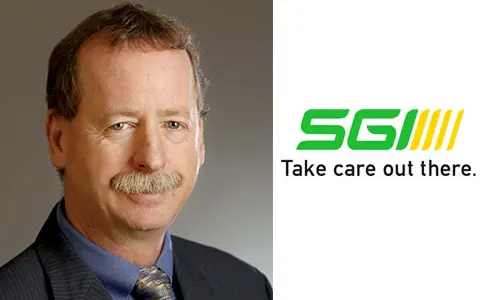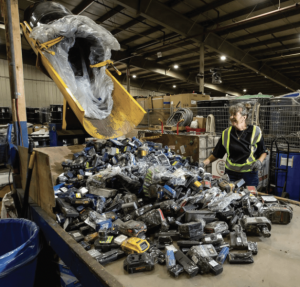Effective December 31, Earl Cameron, Executive Vice President of the Auto Fund, Saskatchewan Government Insurance, is retiring after 44 years of service. The following is an interview between Cameron and Marie Schultz, Communications Consultant, Media Relations, of SGI. Together, the pair explore Cameron’s career path, retirement and future.
By Marie Schultz
Saskatchewan, Regina — December 20, 2017 — I remember the day clearly. I had just gotten back from a meeting, and there was an email sitting on my computer from Andrew Cartmell. It was titled, “Retirement Announcement.” I wondered, who is it this time? And then: GAAASP! Earl. Cameron. Is. Retiring.
I messaged Earl right away to give him grief and he replied, “I have decided insurance is just too boring!”
I got to know Earl pretty well over the last few years while working in Media Relations on big projects like motorcycle rates, photo speed enforcement and the latest changes to impaired driving laws—all hot topics with the media and our social media followers that require very strategic communication.
After letting this retirement announcement sink in for a few days, I went to his office to get some information about his decision. He was reading a paper on cannabis that listed some recommendations for SGI to consider when it becomes legal next July. After 45 minutes of chatting about impaired driving, traffic safety and the implications of introducing cannabis, we officially started the interview. That’s what I love about Earl—he’s incredibly passionate about his work and you can have real conversations with him, without getting nervous that he’s an EVP.
Marie Schultz: So, 44 years! Why now?
Earl Cameron: It’s just time. I thought it would happen at 53 after working here for 35 years, but that didn’t happen, I still had kids at home. Then I thought it would be two to three years ago, but I wasn’t ready. I truly love coming to work every day. It’s interesting! Some days are more fun than others, and some people may think I’m crazy because I still like it, but I do. My wife, Joyce, retired from underwriting here two years ago and we want to spend more time together while we’re young and healthy. I’ve lost a couple friends already and that made me think. Every day you work is one less day of retirement.
EC: But you have some pretty high profile projects happening right now. How are you feeling about leaving them behind?
Uber and cannabis are exciting. They will have some headaches, but I’m leaving the work in capable hands. Who would have thought 10 years ago that those two things would ever be a project?!
MS: No kidding! So you haven’t always been in the Auto Fund, you were in claims for 12 years before making the switch in 2012. Which one do you prefer?
EC: That’s a trick question! You want a quote, I’ll give you a quote, this is a good one: Claims was the most interesting, but the Auto Fund was the most rewarding. Because of Traffic Safety. We could make a difference. In claims, every person you met was unique because they had their own story; they were in a car crash, their home burnt down, they had an injury, then some claims had elements of fraud, legalities, investigations—you sure learned a lot, and a lot about people.
MS: What about the Auto Fund? You said it was the most rewarding. What are you most proud of?
EC: The traffic safety changes in 2014. It was the first time there was an all-party committee for traffic safety, so with everyone working together we came up with life-saving changes. And since then, I can see the way those laws are making a difference. We’re saving lives. This year, there may be around 100 deaths. Considering there were 183 deaths in 2012, that’s pretty significant. I think people are changing. I’m seeing a difference in alcohol consumption and people being more diligent about planning sober rides home.
Most recently, SGI won a Premier’s Award for Excellence in the Public Service for the spring ad campaign that featured real Saskatchewan people who were killed in impaired driving crashes. It was an impressionable campaign. A lot of work went into that, including working with the victims’ families about what was probably the worst day of their lives. It made people talk, and think—this could actually happen to me. Watching the ad for the first time, you think it’s just stock imagery, but then you see the victim’s name, and that they were from Saskatchewan, maybe even your home town. Maybe you knew them. It hit home with probably everyone who saw it. I don’t think there’s anyone in this province who hasn’t been impacted by impaired driving to some degree.
MS: It gives me chills every time I see it. I’ve always been impressed with how calm your demeanor is during media interviews about heated topics—nothing seems to ruffle your feathers. But you got pretty choked up at a few impaired driving related events. Do you have a personal connection to impaired driving?
EC: I’ve met the families of the people featured in the “People Shouldn’t Disappear” campaign. I’ve seen how losing someone to impaired driving has destroyed their lives. And it’s 100 percent preventable. The one that really hit me is Tanner Kaufmann. He just went out to walk the dog. He never thought he wouldn’t make it back home that night. His wife never thought she’d never see him again. I met his wife. He left two boys behind. Those two little boys have to grow up without their dad. I can’t imagine leaving behind my wife and kids. As a dad myself, it really hit me. This has to stop. It’s completely preventable. You don’t ever expect something like that to happen. So yeah, I got emotional. I’m getting emotional now.
MS: Let’s move on to something lighter. Why did you first apply here?
EC: True story?
MS: Yep.
EC: I came in from the farm and needed a job. I was just going to work for the summer because I was enrolled in commercial flying school in Castlegar, British Columbia. I applied at SaskPower, SaskTel and the Wheat Pool—there was no SaskEnergy yet.
MS: Energy wasn’t around then? So you worked here longer than gas was in Saskatchewan!?
EC: Schultz, come on now. (You know you’re in his good books when he calls you by your last name. He got in trouble once for calling Sherry Wolf, ‘Wolf,’ but he said it was a sign of camaraderie. You can’t just call anyone by their last name, they have to earn it.)
Three days after school let out, the director of human resources called me at the farm at eight at night asking if I could report to work the next morning. After I accepted he asked if I was coming in from the farm … did I even own a tie to wear? I was a little put off to be asked such a question, but I had to tell him I didn’t, but that I could borrow one from my dad.
You had to dress the part back then, you had to wear a tie and look sharp. Still in my early years here, one of my managers was telling me I was a good employee, I’m doing a good job yadda, yadda, yadda, but occasionally—and this made me angry—but occasionally, I let my hair grow too long. Seriously! In 1973! He wasn’t saying that to be mean, but it bothered him. He was an older guy and we were all hippies. Man, I had great hair. Or so I thought.
MS: Did you ever think in your wildest dreams that you’d still be at SGI 44 years later?
EC: Not at all! It’s funny, I thought I’d just work the summer, then thought I’d work for a year—I can learn to fly anytime. I think what prevented me from leaving was two things: 1. I really liked it here, and 2. Back in ‘73 you would get promoted every week (chuckles) —there were numerous opportunities and lots of young people your age.
MS: Any P’Earls of wisdom for climbing the corporate ladder?
EC: Get a mentor. Someone you aspire to be, and surround yourself with lots of those people. Pay attention to the people in the room around you—how they behave. For example, I learned from Sherry Wolf to always take the high road.
Take every opportunity you get. If you’re asked to take something extra on, do it, and do it without complaining. People notice those things.
When faced with tough questions, don’t waste your emotional energy. You’re not going to win if you’re confrontational.
Don’t ever underestimate your ability.
Have a willingness to work together as a group to find a solution. The first thing to say in a group setting is, “we’re going to fix this and here are some parameters,” instead of “we’ll never get this done.”
When you’re a new manager, you’re picked more for having promise than skill. You have the skills but you don’t know what they are yet or that you have them.
And just for good measure, don’t hug anyone or take candy from someone’s candy dish unless invited.
MS: After 44 years of waking up and coming to work, what’s your new purpose?
EC: I guess that’s what I’ll find out. Joyce and I bought a camper a few years ago to prepare for retirement. We camped a lot when the kids were young. Our best holidays were the holidays with the camper trailer—free from rules and time. We still love it and have just as much fun as when we were younger, but now we go to bed a little earlier. I’m also looking forward to more hunting, fishing and riding my Harley.
MS: In your retirement announcement, Andrew mentioned you’ll probably get involved with some other organizations—do you have anything in mind?
EC: I’m still the “Grand Puba” of Blue Goose and I’d like to continue doing that—we raise money for SaskAbilities. Their clientele really benefits from the extra attention. It’s very special to them. When you’re young, you don’t really notice how little it takes to make someone feel special. I didn’t really understand that until later in life. It hit home for me when Joyce’s nephew was born with down syndrome. That’s a tough life, what do you do as a young adult with down syndrome? SaskAbilities is a great place for people with special needs. Christmas is almost magical there—they get so excited, they look forward to the annual KFC Christmas lunch and love visiting with the volunteers. I met a young fella one year, just met him the once, and he remembered me the following year. We were buddies so he came and got me so I would sit with him to eat. Seeing that excitement over something that’s so simple for most people, it really makes me feel good. It doesn’t take much effort at all to get a little more involved in your community or to do something special. So who knows, maybe I’ll do more stuff like this. I want to do something that adds value and makes a difference.
Yep, Andrew was right, this company and this province truly are better places because of you.
For more information on Saskatchewan Government Insurance, please visit sgi.sk.ca/salvage_sales.


























